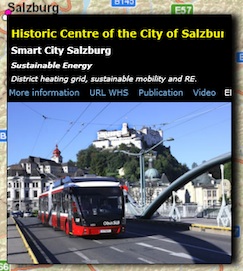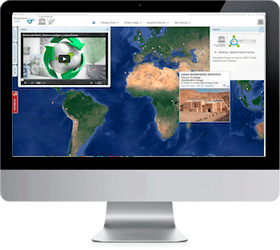From pioneering work to a holistic energy and climate.
 Salzburg is the fourth-largest city in Austria and the capital of the federal state of Salzburg. The city is noted for its Alpine setting as well as its historic centre, which was listed as a UNESCO World Heritage in 1997.
Salzburg is the fourth-largest city in Austria and the capital of the federal state of Salzburg. The city is noted for its Alpine setting as well as its historic centre, which was listed as a UNESCO World Heritage in 1997.
With many climate protection projects such as Stadtwerk-Lehen (Concerto Initiative: Green Solar Cities) and the Smart Grids Model Region, the culture and tourism capital Salzburg (150,000 inhabitants) has a well-developed basis of emission-reducing initiatives.
Based on this wide range of already carried out pioneering work, the next logical step now is the creation of a comprehensive master plan for the continued development into a smart city.
The areas of focus are the expansion and optimisation of the district heating grid in accordance with the town planning and development strategies and also a further reduction of the primary energy requirement from non-renewable energy sources.
Vision developed until 2020 / 2050:
- Residential buildings are zero-energy buildings / plus energy buildings and are integrated in a total system; they show a carbon-neutral footprint within this system
- Production and distribution of energy with smart grids and use of the potentials of renewables
- Mobility is completely adapted to a smart transport-service system on demand
- Humans and their lifestyle contribute to a new energy culture by active civic participation, involvement of educational establishments
- consequent energy- and climate protection policy by responsible persons and circumstances support Salzburg on it’s way to an international known “smart city Salzburg”.
Roadmap developed
When viewing the different development scenarios it showed up that the continuation of the current measures until 2050 will double the share of renewables on the local production from 8.8% up to 16.6%. This increase basically results from the completion of the hydro power plant on the Salzach (Sohlstufe Lehen) in 2013. In scenario 2 this value can almost be doubled up to 32% with reasonably achievable rates of growth in solar energy, biomass and ambient heat. However, this is based on substantial reductions in energy consumption (renovation rate of 2%). With maximum efforts in reducing the energy consumption (renovation rate 3%) and by tapping the full potential of renewables a share of 77.8% can be reached.
Source: Smart Cities Demo
Smart City Salzburg Report - PDF
Sustainable mobility: ADVANCE project















